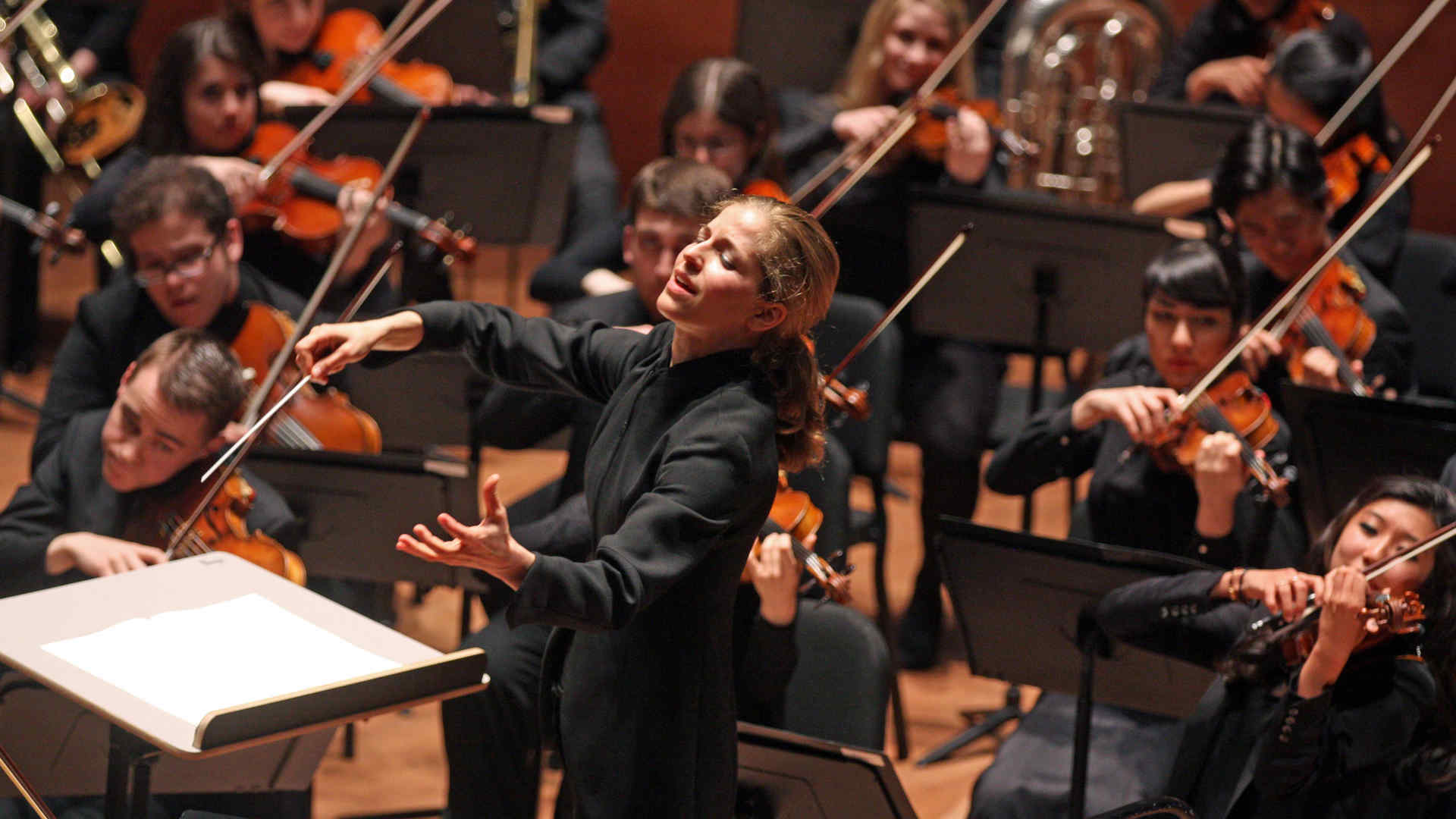
Juilliard Orchestra
In early summer, the first of several record-breaking heat waves scorched Western Europe just as Karina Canellakis (MM ’13, conducting studies) was settling into her new home in Amsterdam. The young American conductor has been racking up successes so fast that she’s been compelled to acclimate to wildly varying situations. But her engagement to conduct the Juilliard Orchestra season-opener, on September 21, will bring the Juilliard alumna back to a familiar setting.
In 2004, the native New Yorker—and daughter of pianist Sheryl Swint Canellakis (BM ’68, MS ’69, piano) and conductor Martin Canellakis (BS ’64, MS ’65, piano) and sister of Nicholas Canellakis (’10, Academy)—began Juilliard’s graduate program in violin. And if not for a sudden success, Karina would have gladly spent more time here at that point. It was one semester into her studies that she was accepted into the Berlin Philharmonic’s prestigious Orchester-Akademie. “I had a great experience studying violin at Juilliard with Donald Weilerstein and Ronald Copes,” she said in this summer’s interview. “They made such a good team and complemented each other as teachers. I do wish I’d had more time with them.”
But the Berlin position allowed Canellakis to fulfill a dream. She’d been obsessed since childhood with the Berlin Philharmonic—her family had always gotten tickets when it was in New York—and while she was studying in Berlin, she came to the attention of Simon Rattle, the ensemble’s chief conductor, who said she had the makings of a conductor. “Simon knew I was interested. Some orchestra members mentioned how I was sneaking around with copies of the score and seemed especially observant and alert to what the conductors were doing.” Even though Canellakis had been laser-focused on developing her violin career, Rattle’s encouragement pushed her toward conducting—and eventually back to Juilliard, where Alan Gilbert (Pre-College ’85, violin; MM ’94, orchestral conducting), with whom she had played in Berlin and at Aspen, became another mentor. He encouraged Canellakis to enter the orchestral conducting program during the first year he headed it, telling her “he thought studying conducting seriously would make me a better violinist at the very least.”
Canellakis, now 37, and recipient of the 2016 Georg Solti Conducting Award, remarked on the differences between the lives of a conductor and a violinist. “Physically, I’ve had to change how I behave on a daily basis: paying more attention to sports, working out more, eating better, and taking better care of myself—and taking time to just ponder a piece of music in a way I didn’t get to as a violinist. And I think it has made me a better violinist when I play. I wish every musician would study conducting and take a week off their instrument just to go to concerts and listen.”
"If you love the music enough—and are prepared to learn how to deal with rejection, which is incredibly important—everything will fall into place. Be true to yourself and focus on the music."
About five years ago, a master class with Fabio Luisi at the Pacific Music Festival in Japan kindled Canellakis’ fascination with opera conducting, and shortly after that came “the moment I realized that I could actually be a conductor.” It happened in 2014, just after Canellakis started her first professional conducting job, as assistant with the Dallas Symphony under Jaap van Zweden (’79, violin). At the last minute, she filled in for the injured van Zweden to conduct a subscription program of Shostakovich’s epic Eighth Symphony and a Mozart concerto. Despite her not having had the opportunity to rehearse with the orchestra or soloist, the concert was a rousing success. Over the subsequent two years, she conducted 30 concerts per season with the orchestra and began to feel “like a different person and like conducting was the most natural way of making music for me—even more so than the violin.”
Fast-forward to the present, when she’s beginning two significant European posts: chief conductor of the Netherlands Radio Philharmonic Orchestra and principal guest conductor of the Rundfunk-Sinfonieorchester Berlin, where she is also the orchestra’s artist in focus for the season. And, of course, returning to lead the Juilliard Orchestra this month.
Her orchestras in the Netherlands and Berlin are both recognized as champions of new music, and Canellakis wanted to include a contemporary piece in her program here: the American composer Missy Mazzoli’s Sinfonia (for Orbiting Spheres), the European premiere of which she led two years ago at the BBC Proms, where she made history in June as the first woman to conduct the First Night. Also on the program are Beethoven’s Second Piano Concerto and the Richard Strauss tone poem Ein Heldenleben. Within that massive canvas, Strauss made room for numerous instrumental solos, writing especially prominent parts for the concertmaster and principal horn. “The experience of playing this piece will form lifelong memories for the players,” Canellakis says. “I have incredibly special memories of playing this piece in the second violin section of the Berlin Phil on a tour to Asia in 2005 under the direction of Simon Rattle. Strauss has these over-the-top, ecstatic moments, but then on the other side of the spectrum, the intimacy he can create with so many players on the stage is extraordinary.”
Canellakis says of conducting at Juilliard, “I love to work with young people and find out what their musical interests are. I hope the students will feel I’m somehow close enough in age that I am approachable but also far enough away that I have different perspectives they can learn from.” As for advice for up-and-coming conductors, she says, “if this is what you want, just keep going. If you love the music enough and are methodical and organized—and prepared to learn how to deal with rejection, which is incredibly important—everything will fall into place. Be true to yourself and focus on the music.”
Thomas May writes about music and theater and has published books on Wagner and John Adams